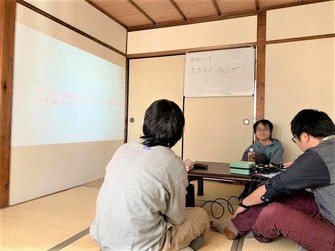
This photo provided by Democratic School Himawari shows pupils in attendance having a meeting. (Photo has been altered)
OTSU — The first “democratic school” in Shiga Prefecture, western Japan, opened here this month, amid a growing trend in the country for an education style in which children learn and build things on their own, with a focus on independent learning.
The education model, originating in the United States, focuses on self-guided learning rather than directing and managing the children. The Mainichi Shimbun spoke with Myoue Akita, Democratic School Himawari’s 37-year-old founder.
Democratic schools like School Himawari are also known as Sudbury schools, modeled after the Sudbury Valley School started by U.S. educator Daniel Greenberg. Based on the precept that people have an inherent ability to learn on their own, pupils are given the freedom to make their own decisions and are equal to adults in matters such as making school rules and managing its operations. Such schools have opened across Japan.
Akita started with the ideas of fun learning and lifestyle education from his eight-year experience as an elementary school teacher. After being surprised while playing games or programming with kids by their ability to think for themselves, he got a keen sense of their independence. “Will their skill in subjects like Japanese and arithmetic really lead to children’s happiness? Is getting into college and working in society really the goal?” Akita wondered. He added, “I don’t think the education we provide in schools is good for anyone. I want them to make their own decisions about their lives, not be influenced by adults’ values.”
He restarted his school under those values, setting it up in a rented house in Otsu. There are currently three students: two in the third year of junior high school and one in their first. Attendance in-person ranges from never to around twice a week. Some of the students don’t attend every day for reasons such as “not getting along with the teacher” or finding the classes uninteresting or hard to keep up with. The parents have apparently come forward with thoughts such as “I want them to interact with all kinds of people” and “I want them to also make the most of their time outside the home.”

Democratic School Himawari founder Myoue Akita is seen at his school in the city of Otsu, April 11, 2025. (Mainichi/Mayu Kikuchi)
The most important time at an independence-oriented school like Himawari are the “meetings” when the students and Akita together decide and act upon problems like “Are we making lunch, and if so, how much will it cost?” Akita, the only staffer, sometimes steps in to support when needed as discussion stalls.
“If kids do something they love, they learn a lot through it. I think it’s good when there’s something they like or want to do to spend their lives on,” said Akita.
Akita was recently happily surprised. A student who had stopped attending in around the fourth grade of elementary school, now in the third year of junior high, said they wanted to attend classes three days a week and study math so they could go on to high school. Akita was impressed, recalling, “It’s totally different whether a student attends school because it’s expected or because those around them encourage them into it and such, versus when they choose themselves to go to school. I thought it was great that they had a clear purpose and had made their own decision.”
Akita said, “I don’t think what I’m trying to do is for everyone,” adding, “It’ll be good if children and parents can easily choose the right place for them.”
(Japanese original by Mayu Kikuchi, Otsu Bureau)


AloJapan.com